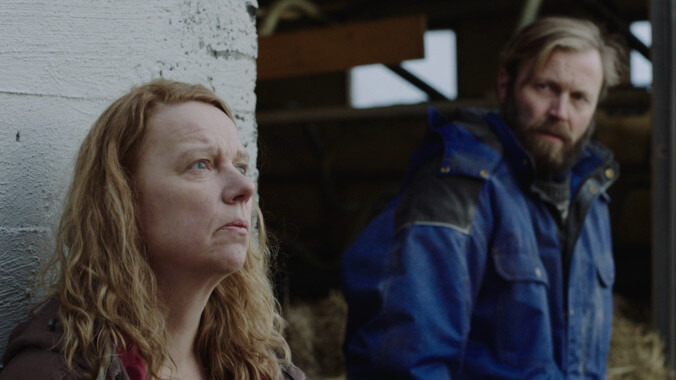Nobody passes go in Iceland’s monopoly drama The County

Note: The writer of this review watched The County on a digital screener from home. Before making the decision to see it—or any other film—in a movie theater, please consider the health risks involved. Here’s an interview on the matter with scientific experts.
At a brisk 92 minutes, The County takes less time to watch than the average Monopoly game takes to play, while offering much the same grim lesson. Our hapless token—let’s make it the wheelbarrow—is Inga (Arndís Hrönn Egilsdottír), an Icelandic dairy farmer who works alongside her husband, Reynir (Hinrik Ólafsson), producing milk for the neighboring rural community, consisting largely of other farms. To be more specific, they sell their milk to a company known as the Co-op, which purchases virtually everything that local farmers produce and expects complete brand loyalty to their own market in return. Anyone who tries to acquire necessary supplies more cheaply elsewhere—in Reykjavík, say—discovers that their business no longer has any customers; even those who don’t sell directly to the Co-op are patronized by people who do, all of whom fear potential retaliation. Indeed, the Co-op effectively owns most industry in the area, having lent money and/or equipment to everyone. That very much includes Inga and Reynir, who are so deeply in debt that they can barely keep up with payments to the Co-op, much less turn a profit.
The County relates what happens when Reynir unexpectedly dies, having driven his truck off the road and over a small cliff late one night. Already heartbroken, Inga soon receives more bad news: Reynir’s accident appears to have been suicide (there are no skid marks suggesting a loss of control), and he’d been serving, unbeknownst to her, as a Co-op spy, reporting neighbors who surreptitiously bought supplies from an outside source. Had he refused to do so, Inga is told, they’d have lost the farm long ago. Her subsequent Facebook screed, entitled “The Co-op Mafia,” gets media attention and sets her on a collision course with Eyjólfur (Sigur∂ur Sigurjónsson), the company’s dapper but ruthless manager. Both parties appeal directly to the community, with Inga attempting to establish a rival co-op that would be genuinely cooperative while Eyjólfur not only puts on the squeeze but cheerfully insists that the whole village can make out like bandits if they just keep toeing the line. Sure, they’re making the Co-op rich at their own expense, but that wealth can be used to attract rich city folk, who’ll buy summer homes there. It’ll all trickle down!
Inga’s not having it, and The County’s strongest asset by far is Egilsdottír, who gives the sort of beaten-down yet truculent performance on which Frances McDormand now has a near-monopoly of her own in the U.S. It’s even plausible that McDormand could someday play the role, since writer-director Grímur Hákonarson’s previous feature, Rams, recently got an English-language remake (albeit Australian rather than American) starring Sam Neill. The mordant sense of humor that made Rams’ Icelandic incarnation so darkly charming, however, is entirely absent from this follow-up, which has more in common with a conventional rabble-rouser like Norma Rae. Hákonarson alternates between crowd-pleasing defiance—at one point, a furious Inga drives one of her supply trucks to the Co-op’s headquarters and sprays milk all over the building’s windows—and a downbeat assessment of how much change is realistically possible, never fully committing to either mode. The result feels less complex than just wishy-washy, exemplified by a late moment in which the soundtrack blares what sounds like an Icelandic pop song from the ’80s (Inga would be the right age, somewhere around 50), signifying liberation, only to cut it off mid-note and let an oppressive silence fall. It’s “Get out of jail free” and “You are assessed for street repairs” on the same Community Chest card.